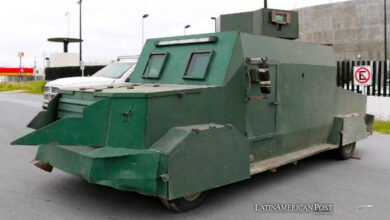The new president of Costa Rica, Rodrigo Chaves, will have a difficult political panorama with minorities in congress and with a "populist" speech.

Photo: YT-Tv South Channel 14
LatinAmerican Post | Santiago Gómez Hernández
Listen to this article
Leer en español: El difícil panorama político que afrontará Rodrigo Chaves en Costa Rica
Rodrigo Chaves was elected last Sunday as the new Costa Rican president with 52.81% of the votes, beating José María Figueres with 47.2%, after more than 95% of the tables counted. Chaves managed to capture the undecided vote or that of other candidates, such as the conservative New Republic Party, the Christian Social Unity Party or the Progressive Liberal Party, who finished 3rd, 4th and 5th in the first round.
Now Chaves will have to face a divided country with little support from Congress, where he only has 10 of the 57 seats. For this reason, Chaves himself asked Figueres to work together as soon as he took office. If he does not obtain the support of Figueres and his National Liberation Party (19 seats), he will need to form a coalition and look for projects together with the other minority forces within the legislature such as the PNR, PUSC or PLP, and thus be able to form majorities that make it easy for him to manage.
Also read: Daniel Ortega is left alone: What reading can be done about it?
This, in a context of little support for the new government. Because, if it is true that he got more than 50% of the votes, the majority were anti-PLN votes and Chaves himself generates distrust in the population. This was also reflected in the low voter turnout of over 42% in the second round (the highest in recent history).
Chaves' election marks a before and after in national politics. The new president won with an anti-establishment platform and away from the traditional policy that had its maximum expression in Figueres (former Costa Rican president). This, accompanied by an abstention rate of 42.85% in the second round, demonstrates the great distrust that exists in the Tico people towards their institutions.
Chaves' supporters branded Figueres as corrupt and representing the same politics that has governed Costa Rica for decades. The National Liberation Party has been the party of not only Figueres, but of Laura Chinchilla, Óscar Arias, Luis Mongue Álvarez, Daniel Obduber Quirós, among others.
Ayer hubo elecciones en Costa Rica: ganó un candidato anti-sistema.
Desde que empezó la pandemia hubo 7 elecciones presidenciales en LatAm y en ningún caso ganó el oficialismo.
???????? (2020)
???????? (2020)
???????? (2021)
???????? (2021)
???????? (2021)
???????? (2021)
???????? (2022)— Javi C (@javicaches) April 4, 2022
Chaves is a 60-year-old economist who, despite having held the position of finance minister during the presidency of Carlos Alvarado Quesada (outgoing president), upheld the flags of change. He has worked for more than 27 years in international organizations and in development economic policies. He has a Ph.D. in economics from The Ohio State University and received a scholarship from Harvard University.
He was an official of the World Bank and had to resign after scandals of sexual harassment of colleagues and subordinates. However, despite not having been one of the most notorious candidates, in the first round he surprised in second place with 16.78% of the votes, only 2% more than Fabricio Alvarado Muñoz in third place and more than 10% below Figueres.
Harassment accusations against Rodrigo Chaves
In August of last year, a sanction was issued by the World Bank against the then candidate for alleged "sexual advances" that occurred between 2008 and 2013 when he was an official of the organization was made public. The case links Chaves to two junior professionals, subordinates of the current president-elect of Costa Rica.
This led to the fact that in 2019, the Human Resources Vice Presidency transferred Chaves to a lower-ranking position without being able to be promoted for a period of 3 years. For his part, the politician has insisted on his innocence, despite the serious complaints and the measures taken by the World Bank itself.





